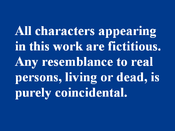- All persons fictitious disclaimer
-
An all persons fictitious disclaimer is a disclaimer in which a work of media states that all persons portrayed in it are fictitious. This is done to reduce the possibility of legal action for libel from any person who believes that he or she has been libeled via their portrayal in the work (whether portrayed under their real name or a different name).
Such a disclaimer often reads similarly to the following:
- All characters appearing in this work are fictitious. Any resemblance to real persons, living or dead, is purely coincidental.
The wording of this disclaimer differs from jurisdiction to jurisdiction, and from country to country, as does its legal effectiveness.
Contents
Origins
The disclaimer originated with the 1932 MGM movie, Rasputin and the Empress, which insinuated that the character Princess Natasha had been raped by Rasputin. Princess Natasha's character was supposedly intended to represent Princess Irina of Russia, and the real Princess Irina sued MGM for libel. After seeing the film twice, the jury agreed that the princess had been defamed.[1][2][3] Princess Irina and her husband Felix Youssoupoff were reportedly awarded $127,373 in damages by the English Court of Appeal in 1934 and $1 million in an out-of-court settlement with MGM.[4][3][1] As a preventative measure against further lawsuits, the film was taken out of distribution for decades.[3] Prompted by the outcome of this case many studios began to incorporate an "all persons fictitious" disclaimer in their films in order to try to protect themselves from similar court action.[5]
Use for comedic purpose
Because the disclaimer is intended for serious purposes, it is often the subject of comedic satire. The Three Stooges' parody of Nazi Germany, "You Nazty Spy", stated that "Any resemblance between the characters in this picture and any persons, living or dead, is a miracle." The sequel I'll Never Heil Again features a similar introduction. In the film An American Werewolf in London, and in "Michael Jackson's Thriller" the disclaimer refers to "persons living, dead or undead". An episode of the TV series Red Dwarf included a news report saying an ancient scroll had been found containing such a disclaimer for the Bible. The novel Breakfast of Champions by Kurt Vonnegut features a truncated version of the disclaimer: "All persons, living and dead, are purely coincidental, and should not be construed," referring to the novel's existentialist themes. The memoir A Heartbreaking Work of Staggering Genius, by Dave Eggers, because of its autobiographical nature, features the following play on the usual disclaimer: "Any resemblance to persons living or dead should be plainly apparent to them and those who know them, especially if the author has been kind enough to have provided their real names and, in some cases, their phone numbers. All events described herein actually happened, though on occasion the author has taken certain, very small, liberties with chronology, because that is his right as an American." Richard Linklater's 1990 feature film Slacker ends with "This story was based on fact. Any similarity with fictitious events or characters was purely coincidental." All episodes of South Park open with a tongue-in-cheek disclaimer that begins by stating, "All characters and events in this show – even those based on real people – are entirely fictional. All celebrity voices are impersonated – poorly."
See also
References
- ^ a b "Umberto Eco Afterword". Stanford.edu. 12 April 1987. http://www.stanford.edu/dept/HPS/HistoryWired/Davis/DavisAuthenticity.html. Retrieved 17 October 2011.
- ^ http://www.imdb.com/title/tt0023374/trivia
- ^ a b c "Rasputin and the Empress". Tcm.com. http://www.tcm.com/thismonth/article.jsp?cid=89000&mainArticleId=276063. Retrieved 17 October 2011.
- ^ http://www.imdb.com/title/tt0023374/trivia
- ^ http://www.imdb.com/title/tt0023374/trivia
- Hulton v Jones [1910] AC 20
Categories:- Tort law
Wikimedia Foundation. 2010.

